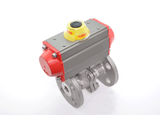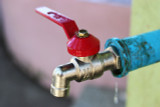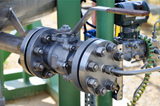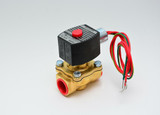Stainless Steel Valves
Stainless steel is one of the best materials for valve construction. It's relatively lightweight, resistant to corrosion, and reasonably affordable. Let's take a closer look at stainless steel valves, their advantages, and their potential uses.
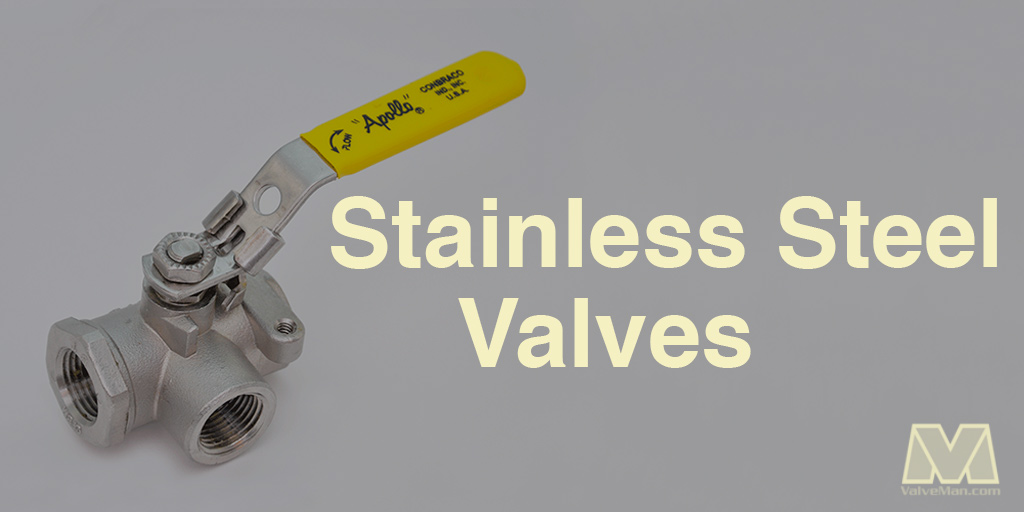
What Is a Stainless Steel Valve?
Stainless steel valves are any kind of valve consisting of stainless steel. You may find stainless steel water valves used to transport liquids. But these valves may also be used to transport gases or other fluids.
What Are the Common Applications of Stainless Steel Valves?
Because valves of stainless steel are so strong and resilient, they are used in many different applications. Some of the industries and applications where you may see these stainless valves used include the following:
- Oil and Gas Industry: In the oil and gas industry, the stainless steel valve often finds uses because it's resistant to the corrosive aspects of petrochemical products.
- Power Generation: Power generation plants may use the ss valve to control the flow of water and other chemicals.
- Water and Wastewater Treatment: Water and wastewater treatment plants often use the stainless steel valve for controlling the flow of water and purification chemicals.
- HVAC Systems: Heating venting and cooling systems require a stainless valve for the control of water, cooling fluids, and other liquids.
- Mining Industry: The stainless valve is useful in the mining industry, where corrosive chemicals and byproducts are commonplace.
Stainless Steel Valves - Available Materials and Sizes
As the name suggests, a valve of stainless steel cannot consist of any other type of material. However, they do come in an array of types and sizes. They may also have different types of end fittings.
From minute to very large, threaded to unthreaded, the array of stainless steel valve options is endless.
What Are the Advantages of Using Stainless Steel Valves?
So, why should you choose a stainless valve over PVC, brass, or carbon steel valves? There's a multitude of reasons why you may want to choose these valves. Some of the benefits include the following:
- Corrosion resistance - stainless steel offers excellent resistance to rust and corrosion, making it excellent for use with corrosive chemicals.
- Versatility - This type of stainless valve is ideal for many different uses, meaning that it offers excellent versatility.
- Cost-effectiveness - Because stainless steel valves aren't prone to breakage or corrosion, they can last for a really long time. Because of this, you get excellent value for money.
- High-pressure ratings - Due to its high tensile strength and general toughness, well-designed valves of stainless steel can handle very high pressure. This means that these valves often have a higher pressure rating than their PVC counterparts.
- Low maintenance - Because they're not prone to damage, failure, or other kinds of breakage, stainless steel valves generally have minimal maintenance requirements.
- Compliance with industry standards - Stainless steel valves typically conform to a rigorous set of compliance standards. This means you can install them in your application without concerns about non-conformity.
- Readily available - Stainless steel valves are easily and readily available and generally don't require any extensive seeking on your part.
When Not to Use a Stainless Steel Valve
Despite its wonders, stainless steel has some drawbacks, though they are normally far and few between. While it is compatible with countless chemicals and bases, some are more corrosive to stainless steel than others. Some chlorites, for example, can compromise a stainless steel valve's protective film. Hydrochloric acid, especially, will damage any stainless steel valve. Stainless steel can also cause galvanic corrosion in other metals if there is contact between them, especially in wet environments.
For the majority of applications, though, stainless steel should always be your first choice when selecting a valve that is corrosion-resistant. A stainless steel valve is perfect for the majority of applications you may have in mind, but if you're ever in doubt, just ask your valve distributor.
Frequently Asked Questions (FAQs)
How Do I Select the Right Stainless Steel Valve for My Application?
There are a few elements to take into account when choosing the best stainless steel valve for your application. However, the application itself should always be the primary factor. It's a good idea to specify the application and consider issues like:
- What the system will transport?
- How big is the pipe for the system?
- What is the flow rate and pressure rating for the application?
- Are there special temperature requirements for the application?
- Do you need the valve to be actuated manually or remotely?
The size of the valve to purchase, the material from which it should be made, and the type of actuator it has to have can all be determined by the answers to these questions.
How Should Stainless Steel Valves Be Maintained?
When using stainless steel valves, maintenance is typically not a problem. Stainless steel is a tough material that doesn't easily corrode or wear out. To make sure there hasn't been a buildup of debris, it could be prudent to check valves occasionally.
In some circumstances, lubrication may also be necessary to maintain the smooth operation of valves. But ultimately, a lot relies on the system the valve is utilized on. Regular valve maintenance, such as cleaning, is more likely to be needed in systems that deal with more debris or pollutants.
Where Can I Buy Stainless Steel Valves?
You can purchase any type of stainless steel valve from ValveMan that you need for your application. We have a large variety of valves in various sizes and materials. We have you covered for anything from butterfly valves to ball valves, carbon steel to PVC.
If you need any help trying to decide which kind of valve will work best for your application, feel free to contact us. We'd be more than happy to help you decide which valve would be best for your application.
Our Posts
View AllUnderstanding Valve Sizes and Measurement
Sizing the appropriate valve is critical to ensuring the performance of your system. Whether you'r …
Read MoreTypes of Water Valves
Hey there, fellow valve enthusiasts! We all know that valves play a crucial role in regulating th …
Read MoreWhat is a Backflow Preventer, and How Does it Work?
When a simple check valve is inadequate for the job, you need a backflow preventer. But knowing …
Read MoreValve inspection - main points of valve testing in Manufacture setting
Industrial facilities rely on different types of valves (such as check valves, for example) to con …
Read MoreTypes of Ball Valves
Ball valves are important components in a vast range of systems, from small family-owned workshops …
Read MoreUnderstanding valve standards and specifications
Hey there, fellow valve enthusiasts! Today, we're looking at valve codes, standards and specifica …
Read MoreHow to Tell if a Valve is On or Off
We have all been there before. You are staring at a valve; you know that you should know if it …
Read MoreUnderstanding Different Types of Valve Connections and Fittings
Hey there, fellow valve enthusiasts! We know valves play a crucial role in regulating the flow of li …
Read MoreTypes of Valve Handles: Lever and Handwheels
Whether you're involved in industrial work, plumbing, or you're a DIY enthusiast, you come across va …
Read MoreThe Basic Parts of a Valve
Valves quietly work in many different areas, even places you wouldn't expect. They're truly every …
Read MoreGas Ball Valves In Industrial Applications - 5 Things to Keep in Mind
Unlike the standard ball valves, most gas ball valves are tested and approved by CSA. These valves a …
Read MoreHow To Correctly Use A 3 Way Valve In Different Applications
To understand the "T"-port and an "L"-port 3-way valves and what makes them different, it's importan …
Read MoreIndustrial Ball Valves - 9 Questions To Make The Right Choice
Ball valves are versatile flow control devices suitable for extensive industrial applications. They …
Read MoreEverything you need to know about valve types
Valves play crucial roles in production lines and equipment performance across a multitude of ind …
Read MoreWhat is a Duty Cycle and How Does it Relate to Electric Ball Valves?
Electric actuation improves the efficiency of processes by maintaining the accuracy of the re …
Read MoreActuated Butterfly Valves 101: All You Need To Know About Their Application In Piping Systems
Butterfly valves are quarter-turn flow control or isolation devices, used for quick shut-off in p …
Read MorePractical Guide To Electric and Pneumatic Actuators – Which One To Choose?
While electrical and pneumatic actuators have several unique benefits and are preferred in differ …
Read MoreHow Do Check Valves Affect Water Pressure in the Piping System?
Check valves also known as "one-way" valves are autonomously operated unidirectional valves that all …
Read MoreUsing an Actuated Ball Valve Or a Solenoid Valve For Best Fluid Control In The System
Both ball valves and solenoid valves serve a wide variety of applications. From a&nb …
Read MoreWhat are the types of solenoid valves?
Favored for offering low power consumption, a compact space envelope, superior speed of ope …
Read More



